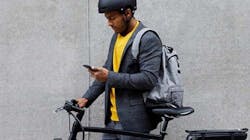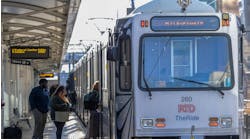LADOT launches universal basic mobility pilot
The Universal Basic Mobility Pilot was launched by the LA Department of Transportation (LADOT) in South Los Angeles. LADOT says the pilot is one of the largest programs of its kind in the country and increases access to transportation options for thousands of Angelenos.
The pilot will bring e-bikes, shared electric vehicle (EV) cars and on-demand EV shuttle service, in addition to a partnership with the Los Angeles County Metropolitan Transportation Authority (L.A. Metro) to subsidize transit fares for 2,000 pilot area residents who have historically lacked options for how to get to where they need to go safely. University Basic Mobility is a concept that believes that robust transportation options are essential to opportunity. Without mobility people cannot access basic needs such as education, employment, housing and healthcare. For example, in Los Angeles today, there are 12 times more jobs accessible in one hour by car than by transit.
“Mobility is essential to opportunity. That is what drives LADOT’s commitment to provide Universal Basic Mobility for Angelenos,” said LADOT General Manager Seleta Reynolds. “As a city, we must prioritize equal access to dignified, reliable, safe and affordable transportation that serves residents' needs regardless of income. This initiative helps empower South LA communities and lay the foundation for a concerted, citywide effort to achieve Universal Basic Mobility.”
The pilot is currently supported by nearly $18 million in state and city funding. The California Air Resources Board (CARB) recently announced that LADOT would be awarded $6.7 million in additional funding from California Climate Investments (CCI) for its groundbreaking pilot, complementing $7 million in funding the department received from the board last year. Earlier this year, the Los Angeles City Council voted to approve $4 million to expand transit subsidies and other program elements.
“We are privileged to partner with LADOT and other community partners to bring this mobility wallet solution to South L.A. residents,” said L.A. Metro CEO Stephanie N. Wiggins. “This is a first-of-its kind pilot for these residents and it will make it easier for them to get to jobs, run errands, shop and travel throughout our county. This pilot also advances our agency’s own mission to provide high-quality mobility options and positively impact communities with equitable and inclusive solutions.”
Through the pilot’s Mobility Wallets, residents in the pilot area will have access to subsidized L.A. Metro transit fares.
“At the South Los Angeles Transit Empowerment Zone (SLATE-Z), we know the Universal Basic Mobility Pilot Program is essential to addressing poverty and ensuring South Los Angeles residents are deeply engaged in the decision-making processes that will impact how they get to school, work, and childcare. Transit provides essential access to life's opportunities, while also reducing the greenhouse gas emissions that have led to harmful health and related impacts in the area,” said SLATE-Z President and CEO Zahirah Mann.
LADOT’s grant application to CARB was drafted with the input of a coalition of South LA community groups represented by SLATE-Z.
The Universal Basic Mobility pilot covers a large swath of South Los Angeles, bounded by the 10 Freeway to the north, South Alameda Street to the east, Crenshaw Boulevard to the west and Florence Avenue to the South. The area was chosen because of the high proportion of households below the poverty line as well as the large share of residents who rely on public transit.
The pilot will:
- Deploy 250 e-bikes.
- Expand Blue LA EV carshare by an additional 100 cars within the pilot zone.
- Provide free, on-demand EV shuttle services.
- Provide subsidized L.A. Metro and LADOT DASH fares for 2,000 pilot area residents.
- Install 16 electric vehicle charging stations at four libraries.
- Install 75 electric vehicle charging stations at Rec & Parks facilities.
- Install two Direct Current Fast Charger hubs.
- Provide workforce training on electric charging stations and electric bikes for 30 Angelenos.
- Provide $1 million in funding to complete the Rail to Rail project.
- Install safe streets infrastructure.
Additional project partners include, CicLAvia, Mobility Development Partners, Blink Mobility, the Los Angeles CleanTech Incubator and EV Go. Additional City departments include LADWP, Bureau of Street Lighting, LA Public Libraries, Recreation and Parks and StreetsLA.


